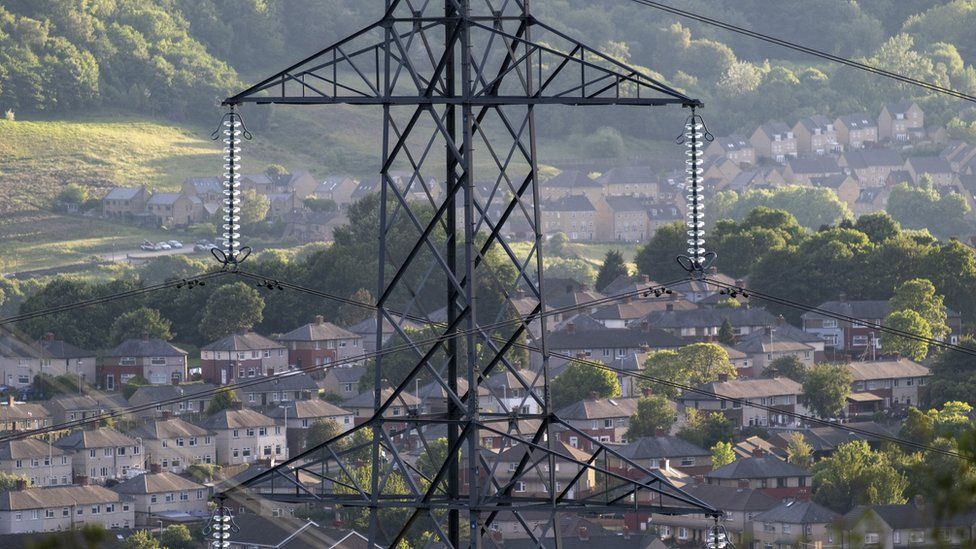ARTICLE AD BOX
 Image source, Getty Images
Image source, Getty Images
By Paul Seddon
Politics reporter
Households should be given cash if they live in the path of new electricity pylon projects, a government-commissioned report says.
The proposal is among several on getting infrastructure built quicker as Britain races to get its grid ready for new renewable sources of energy.
Key is a fast-track planning system to help halve the 12 to 14 years it currently takes to build new lines.
The government is expected to issue its response to the report on Friday.
Ministers are not expected to adopt specific recommendations at this stage, but the BBC has been told the report has been well received within government.
However, the construction of new lines could open fresh rifts with Conservative MPs that are campaigning against planned pylons in their area.
Former environment secretary Therese Coffey and former home secretary Dame Priti Patel are among high profile backbenchers opposing plans for new lines affecting their constituencies.
The government ordered the review in July last year as part of plans to improve the transmission of renewable energy, including from wind farms and new nuclear stations, to homes and businesses.
The report, by energy industry veteran Nick Winser, said the push to decarbonise was being held back by the slow pace of new pylon projects.
It has recommended a streamlined planning process as part of plans to reduce the time it takes to around seven years, and closer alignment between planning rules in Scotland and the separate system for England and Wales.
It said people living near transmission pylons, the larger lines that connect electricity from where it is generated to regional substations, should get lump sum payments from operators.
The report does not recommend specific levels of compensation or qualification criteria. It says a further consultation may be needed to work out a formula, which would need to be approved by the energy watchdog Ofgem.
It also supported community payments for areas where new "visible infrastructure", including substations, is built, to pay for local programmes such as energy efficiency schemes or electric vehicle charging points.
The cost of compensation would be lower than building cables underground, it added, which it said was between five and ten times more than overhead lines. Offshore cables were even more expensive, it noted.
Image source, Getty Images
Image caption,Dame Priti Patel recently took part in a protest against proposed pylons in her Essex constituency
The National Grid says it needs five times more power lines to be built in the next seven years than in the past 30, as part of the transition towards greener forms of energy.
Ministers are currently consulting on new rules for compensation schemes designed to persuade local areas they are "positively benefitting" from having to live near the new infrastructure.
Currently, these are struck project-by-project and paid through consumer bills on a nationwide basis.
Ministers have backed the current voluntary approach to payments, arguing it is quicker and allows for more flexibility, but are "retaining the option to move to a mandatory approach if necessary".
Some campaign groups have backed a mandatory compensation scheme, arguing it would ensure payments are fairer.
New pylon schemes have encountered opposition from some Conservative MPs, particularly in East Anglia, where a number of large projects are under way to bring clean power onshore.
Mr Winser told the BBC that frustration with new schemes was "understandable", adding that there was often "very little context provided" on the benefits and trade-offs of new projects.
He added that better nationwide planning, coupled with community benefits, would make new schemes more attractive and ensure local debates on schemes are "far less heated".
His review also called for a government-led publicity campaign on "the need for a grid refresh," along with a review to tackle a shortage of qualified engineers and technicians.

 1 year ago
32
1 year ago
32








 English (US) ·
English (US) ·